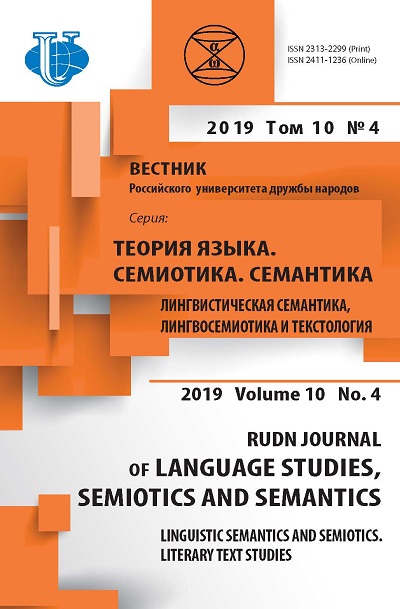Elements of Incorporation in the Russian Commercial Naming
- Authors: Perfilieva N.V.1, Galankina I.I.2
-
Affiliations:
- Peoples’ Friendship University of Russia (RUDN University)
- The Russian State Agrarian University - Moscow Agricultural Academy named after K.A. Timiryazev (RSAU-MTAA)
- Issue: Vol 10, No 4 (2019): Linguistic Semantics and Semiotics. Literary Text Studies
- Pages: 775-788
- Section: FUNCTIONAL SEMANTICS
- URL: https://journals.rudn.ru/semiotics-semantics/article/view/22767
- DOI: https://doi.org/10.22363/2313-2299-2019-10-4-775-788
- ID: 22767
Cite item
Full Text
Abstract
The article is devoted to the problem of word formation incorporation in the Russian language. Incorporation is understood as the merger of two or more words into one morphological whole without the participation of word-forming formants, in which the value of the derivative is transformed in relation to the values of the original words. The derivatives of incorporation are called incorporation complexes. Components of incorporated complexes are classified as quasi-morphemes, which are special elements that do not correspond to the classical notion of lexical or word-forming units. A review of scientific papers on incorporation in the languages of the world demonstrates different approaches to this phenomenon and terminological differences in its definition. Incorporation has been a subject of study for more than a century as an essential characteristic of polysynthetic and analytical languages. In relation to inflectional Russian, this phenomenon has not been systematically described, which determines the relevance of the study and its analysis in this article. This linguistic phenomenon in the Russian language is relatively recent and, of course, requires scientific evaluation. The authors set a goal to determine the boundaries of word-formation incorporation in the Russian language and its differences from similar derivational models. The article considers the incorporation on the basis of the Russian commercial name. The material is collected by the method of continuous sampling from Internet sites. Incoporation complexes are selected among commercial names or ergonyms, which are signs of grocery stores, restaurants, cafes and other commercial establishments. As a result of the research, the classification of ergonyms formed according to the incorporated word-formation model in the modern Russian language is developed. The study is of great interest, as it offers an analysis of the trend actively developing in inflectional Russian. The method of contrastive analysis is used to compare similar examples from modern English. Lexical units from the English language have become the object of study, as the models of word formation of the English language are borrowed together with words. A significant group of examples of Russian ergonyms with borrowed components, among which English-language segments predominate, is also highlighted. The presence of incorporation in the Russian language, in particular, in commercial naming is considered as proof of the universality of certain linguistic phenomena in word formation.
About the authors
Natalia V. Perfilieva
Peoples’ Friendship University of Russia (RUDN University)
Author for correspondence.
Email: perfilyeva-nv@rudn.ru
Candidate of Philology, Associate Professor of General and Russian Linguistics Department, RUDN University
Miklukho-Maklaya Str. 6, Moscow, Russian Federation, 117198Inna I. Galankina
The Russian State Agrarian University - Moscow Agricultural Academy named after K.A. Timiryazev (RSAU-MTAA)
Email: gaii@live.ru
senior lecturer of Russian State Agrarian University - Moscow Agricultural Academy named after K.A. Timiryazev
Timiriazevskaya Str. 49, Moscow, Russian Federation, 127550References
- URL: https://dic.academic.ru/dic.nsf/enc3p/139314/%D0%98%D0%9D%D0%9A%D0%9E% D0%A0%D0%9F%D0%9E%D0%A0%D0%90%D0%A6%D0%98%D0%AF (accessed 05.05.2019). (in Russ.).
- Lexicon of Russian Language edited by D.N. Ushakov (1935—1940), URL: //feb-web.ru/ feb/ushakov/ush-abc/09/usc0705.htm?cmd=0&istext=1 (accessed 12.05.2019). (in Russ.).
- Gumboldt, V. (2000). Selected Works on the Linguistic. M.: OAO Progress, 400. (in Russ.).
- Sapir, Е. (1911). The Problem of noun incorporation in American languages, American Anthropologist, 13 (2), 250—300.
- Baker, M.C. (2006). On Zero Agreement and Polysynthesis, Arguments and Agreement. Oxford: Oxford University Press, 289—320.
- Meshchaninov, I.I. (1978). Parts of Sentence and Parts of Speech. Мoscow; Leningrad: Nauka. (in Russ.).
- Muravyova, I.А. (2004). Typology of the Incorporation. М. (in Russ.).
- Oxford Advanced Learner's Dictionary оf Current English. A.S. Hornby 6th edition (2000). Oxford University Press. pp. 1539.
- Bloomfield, L. (1968). Language. Moscow: Progress. (in Russ.).
- Fabb, N. (2005). Sentence Structure. Routledge.
- Bauer, L. 1978. The Grammar of Nominal Compounding. Odense: Odense University Press.
- Massam, D. (2009). Noun Incorporation: Essentials and Extensions, Language and Linguistics Compass, 3(4), 1076—1096.
- Hall, R. (1956). How we noun-incorporate in English, American speech. Duke University Press, 31(2), 83—88.
- Аnokhina, М.А. (2006) Semantic Incorporation as one of Processes of the Realization of the Cognitive Model of the Verb (on the material of English Language), Polzunovsky vestnik, 5, 73—82. (in Russ.).
- Shustova, S.V. & Smirnova, E.A. (2014). Noun-Incorporation as a Means of Changing Valency of a Verb (the Case of English Verbs with Incorporated Actants), Volzhsky University after V.N. Tatishchev, 1(15), 94—101. (in Russ.).
- Plungian, V.A. (2010). Why are the Languages so Various? Moscow: AST-press. (in Russ.).
- Russian Grammar (1982). Moscow: Nauka, Аcademy of Science of USSR. Institute of Russian Language. Vol. 1.
- Perfilieva, N. (2015). Lexical Innovations in Russian Media Texts. In Multimeditional language words. Proceedings of the international scientific conference. Moscow: Peoples’ Friendship University of Russia. pp. 62—69.
- Rozhniova, О.L. (2010). Flashback In Acquaitances in Monastaries. Мoscow: Blagovest. (in Russ.).
- Perfilyeva, N.V., Novospasskaya, N.V. & Lazareva, O.V. (2017). Effect of the Commercial Name. Journal of Psicholinguistics, 2, 92—107.
- Zhukova, А.Г. (2016). About euphemistic function of ergonims In Proceedings of International Science- Practical Conference “Slavonic Culture: Sources, Traditions, Interaction. XVII Saint Kirill-Меthodiy Conference 24th May 2016”. Мoscow, Yaroslavl: Remder. pp. 91—95. (in Russ.).
- Food and Beveredgies Stores of Moscow URL: https://www.yell.ru/moscow/top/magaziny-produktov-i-napitkov (accessed: 05.05.2019).
- Grocery Stores of Moscow URL: https://2gis.ru/moscow/search/%D0%9F%D1%80%D0% BE%D0%B4%D1%83%D0%BA%D1%82%D0%BE%D0%B2%D1%8B%D0%B5%20(%D0%BF%D1%80%D0%BE%D0%B4%D0%BE%D0%B2%D0%BE%D0%BB%D1%8C%D1%81%D1%82%D0%B2%D0%B5%D0%BD%D0%BD%D1%8B%D0%B5)%20%D0%BC%D0%B0%D0%B3%D0%B0%D0%B7%D0%B8%D0%BD%D1%8B%20%2F%20%D0%93%D0%B0%D1%81%D1%82%D1%80%D0%BE%D0%BD%D0%BE%D0%BC%D1%8B/rubricId/373 (accessed: 05.05.2019).
- Funny Names of Saint Petersburg bars URL: http://checkinandgo.ru/naming/ (accessed: 05.05.2019).
Supplementary files












